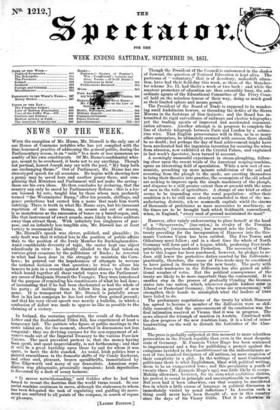NEWS OF THE WEEK.
Wrrif the exception of Mr. Hume, Mr. Disraeli is the only one of our House of Commons notables who has yet complied with the time-honoured practice of addressing the general public, during the Parliamentary recess, in an " aside to a more or less numerous as- eembly of his own constituents. Of Mr. Hume's confidential whis
'"My-
per meant to be overheard, it boots not to say anything. Though
not poetieal, honest Joseph may say with the poet, harp hath one- unchanging theme." Out of Parliament, Mr. Hume has one stereotyped speech for all occasions. He begins with showing how a penny may be saved here and another penny there, and com- plaining- that Ministers and Parliament will not make the saving : these are his own ideas. He then concludes by declaring, that the oonntry can only be saved by Parliamentary Reform : this is a les- son learned by rote, taught him -by, those whom men profanely termed "the Westminster Rump," after his pounds, shillings, and pence preleetions had earned him a name that made him worth catching. There is truth in what Mr: Hume says, but his incessant repetition of the same themes, in. season and out of season, is as monotonous as the succession of tunes on a barrel-organ; and, tke that instrument of sweet sounds, more likely to drive auditors away than attract them. With infinitely less singleness of pur- pose, and an iirdnitelv less tangible aim, Mr. Disraeli has at least variety to recommena him.
- Mr. Disraeli's speech was clever, polished, and plausible ; its only. fault was that it related less to the position of public affairs than to the _position of the lively Member for Buckinghamshire. Amid considerable diversity of topic, the orator kept one object relentlessly in view : he adroitly alluded to the lead taken on various great occasions by the politicians of Bucks ; he reverted to what had been done in the struggle to maintain the Corn- kaws ; he pointed out the hopelessness of attempts to reverse the national decision on that question; he tried to allure his hearers to joii in a Crusade against "financial abuses ; but the link which bound together all these varied topics was the Parliament- ary career of Benjamin Disraeli the Younger. They were introduced for the purpose of reminding his constituents of what he had done; of insinuating that if he had been checkmated so had the whole of his party;' of inciting them to follow him in pursuit of new game. It is transparent that Mr. Disraeli is painfully aware that in his last campaign he has lost rather than gained ground ; and that his very clever speech was merely a bulletin, in which a confession of defeat was made to appear as like as possible to the claiming of a victory.


























